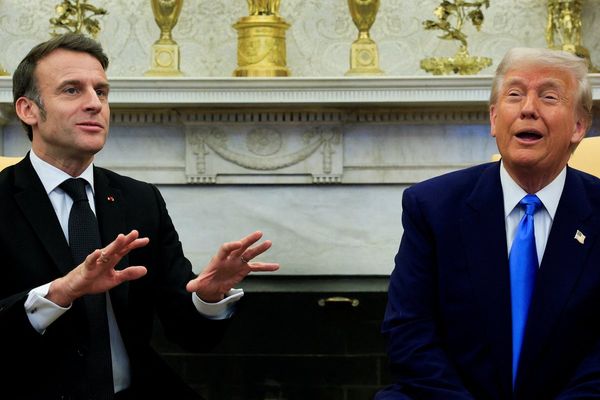Ukrainian farms are turning into small-scale abattoirs, dairy factories and flour mills to ensure their people are fed, as Russia's invasion of the country intensifies.
Farmer Kees Huizinga said without an immediate end to the Russian invasion, agricultural production would plummet in a country known as Europe's breadbasket.
"The food supply chain is broken, so the processing doesn't work, afterwards the distribution doesn't work, then the shops become empty," he said.
"So that's creating local food shortages, especially in the cities."
Dutch-born Mr Huizinga started farming in Ukraine 20 years ago, and now produces cattle, pigs, grains and vegetables on his property 200 kilometres south of Kyiv.
"We have to, and want to share what we have with others, by preparing food for the people in the city who are in bomb shelters," he said.
Mr Huizinga is slaughtering his pigs and the meat is being packed in jars by local volunteers at a nearby school.
Refugees work in his home using flour milled from his grain to make dumplings for the army and people in the cities.
Another farmer, Andriii Pastushenko, has become a small dairy processor on his property 35 kilometres west of Russian-controlled Kherson.
He milks 350 cows on his 1,500-hectare farm, usually supplying the milk to French-owned processor Lactalis.
Prior to the conflict, the 10 tonnes of milk he produced each day would be used to make butter sold under the President brand around the world.
But now his employees are making quark, cottage cheese, sour cream and butter, and sending it to those in need.
"During the first few days of the war a milk carrier took four tonnes of milk to hospitals, aged care facilities and orphanages in Kherson and the leftover milk was distributed for free, one basement per person," Mr Pastushenko said.
"But now Kherson is completely blocked ... all the stores are empty, so are the pharmacies. The only thing I've seen [that] you can get from the city supermarkets is alcohol, as alcohol isn't the most important grocery item for the population at the moment."
Mr Pastushenko is also milling his grain, giving it out for free or selling it for a fraction of the normal price.
"We have also started up a device a few days ago that grinds up barley, wheat, and corn, and we make groats," he said.
"So, it ends up being grinded up grain that you can boil and make porridge, it's a popular food and was even popular prior to the war in Ukraine."
Looming shortage
Every day the war continues, Mr Huizinga and Mr Pastushenko grow increasingly concerned about their ability to keep producing food.
"It's difficult to get fertiliser, fuel, seeds, all those supply lines have been cut off," Mr Huizinga said.
Mr Pastushenko still hasn't been paid for the 80 tonnes of grain he sold before the war, and he hasn't received the sunflower and corn seeds he paid for in September last year.
"I understand that in order to afford paying the wages to my 70 workers, I have to start collecting money already to somehow pay those people, so at least they can buy something," Mr Pastushenko said.
"I can give out that milk without any questions, but I understand that in the next weeks, months or maybe even years I won't be able to buy high-quality feed that is required for high productivity of the flock."
Running short on cash and feed for his livestock, Mr Pastushenko was also being forced by his circumstances to cull unproductive cattle in his herd.
Dairy sector research group InfoAgra revealed on Thursday night dairy production in Ukraine was running between 50 to 60 per cent lower than before the war.
But the Ukraine government has included cheese, butter and canned milk in a program designed to improve distribution of food, according to analyst Maks Fasteyev.
Global problems
Combined, Ukraine, Russia, Romania and Bulgaria account for around a third of global wheat exports each year.
Ukraine is the top producer of sunflower oil, as well as a top exporter of corn and barley.
It is the European Union's fourth largest external food supplier, exporting 52 per cent of its corn, 23 per cent of its vegetable oils and 19 per cent of its soft (lower gluten) wheat.
Mr Huizinga is currently in the Netherlands, representing an organisation of 1,100 Ukrainian farmers, and trying to warn political leaders about the global consequences of a long conflict.
"The rest of the world, particularly the Middle East, Northern Africa and partly Asia is going to feel this gap in the food supply," he said.
The price of wheat has surged in recent weeks, and reports from agribusiness finance firm Rabobank that it may double.
"If they double, as reports suggest they might, I don't want to think about what'll happen to people in the Middle East and northern Africa," Mr Huizinga said.







